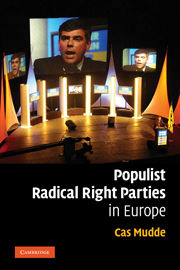Book contents
- Frontmatter
- Contents
- List of tables
- Acknowledgments
- List of abbreviations
- Introduction
- Part I Concepts
- 1 Constructing a conceptual framework
- 2 From conceptualization to classification: which parties?
- Part II Issues
- Part III Explanations
- Appendix A Populist radical right parties
- Appendix B Questionnaire
- Bibliography
- Index
1 - Constructing a conceptual framework
Published online by Cambridge University Press: 22 September 2009
- Frontmatter
- Contents
- List of tables
- Acknowledgments
- List of abbreviations
- Introduction
- Part I Concepts
- 1 Constructing a conceptual framework
- 2 From conceptualization to classification: which parties?
- Part II Issues
- Part III Explanations
- Appendix A Populist radical right parties
- Appendix B Questionnaire
- Bibliography
- Index
Summary
The belittlement of definitions is wrong on three counts. First, since definitions declare the intended meaning of words, they ensure that we do not misunderstand each other. Second, words are also, in our research, our data containers. Therefore, if our data containers are loosely defined our facts will be misgathered. Third, to define is first of all to assign limits, to delimit.
(Sartori 2004: 786)Introduction
Several recent studies on the topic of our concern have started by paraphrasing the famous opening sentence of Karl Marx's Communist Manifesto: “A specter is haunting Europe, it's the specter of …,” followed by the author's term of preference (e.g. Jungwirth 2002b; Papadopoulos 2000). The author will then simply assume that the preferred term accurately labels the “specter,” that the term itself has a singular and comprehensible meaning, and that readers are in agreement with the categorization of the various manifestations of that “specter.”
In fact, during the last few decades commentators worldwide have concurred in their assessment of the similarities and dangers of European political parties as seemingly diverse as Jean-Marie Le Pen's Front national (National Front, FN), Pia Kjærsgaard's Danske Folkeparti (Danish People's Party, DFP), or Vladimir Zhirinovsky's Liberal'no-demokraticheskoi partii Rossii (Liberal Democratic Party of Russia, LDPR). But seldom did they manage to agree on terminology. Both in the media and in the scholarly community an unprecedented plethora of different terms has been put forward since the early 1980s.
- Type
- Chapter
- Information
- Populist Radical Right Parties in Europe , pp. 11 - 31Publisher: Cambridge University PressPrint publication year: 2007



